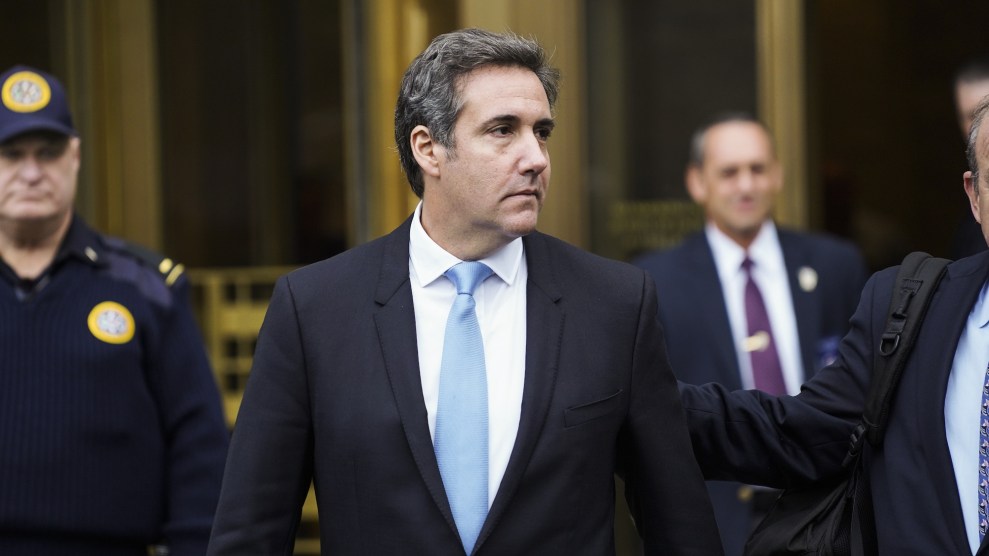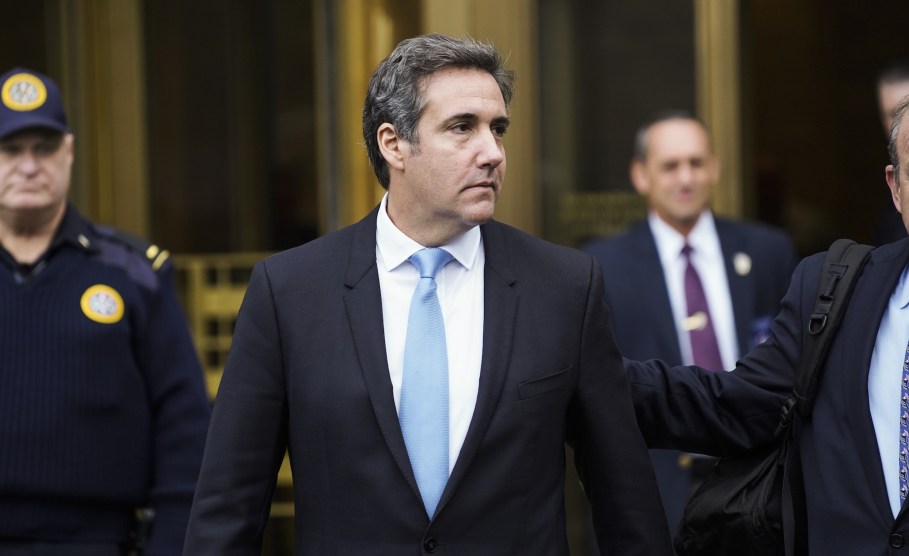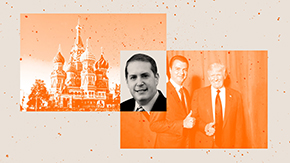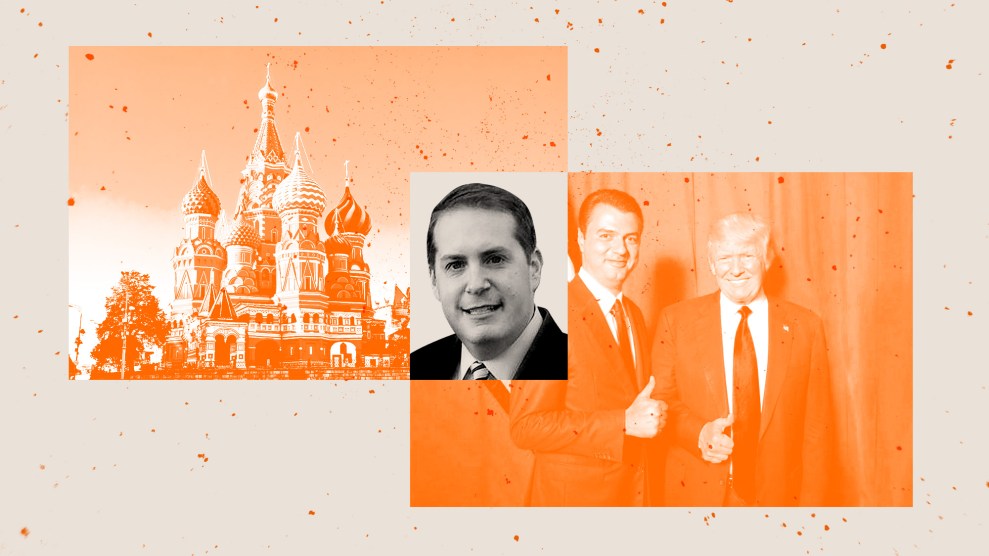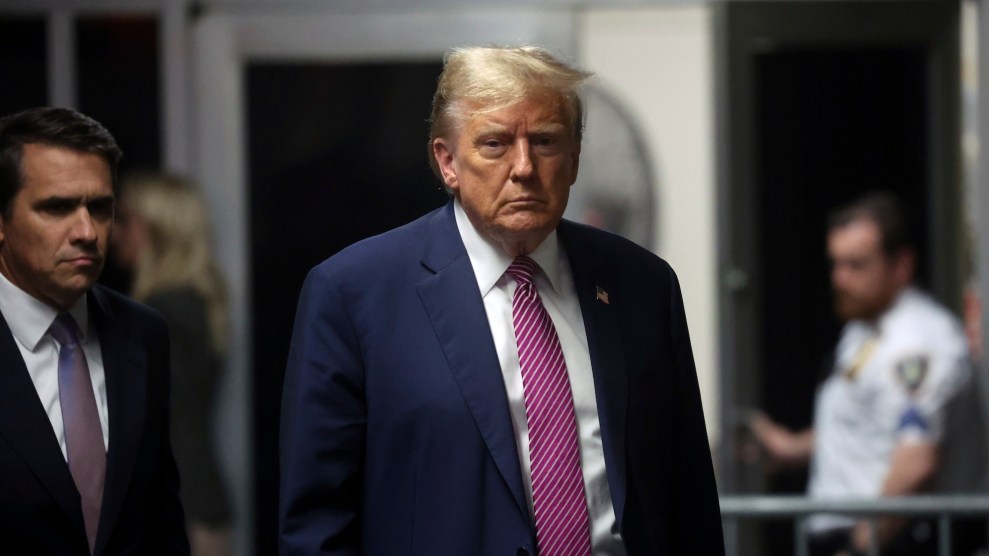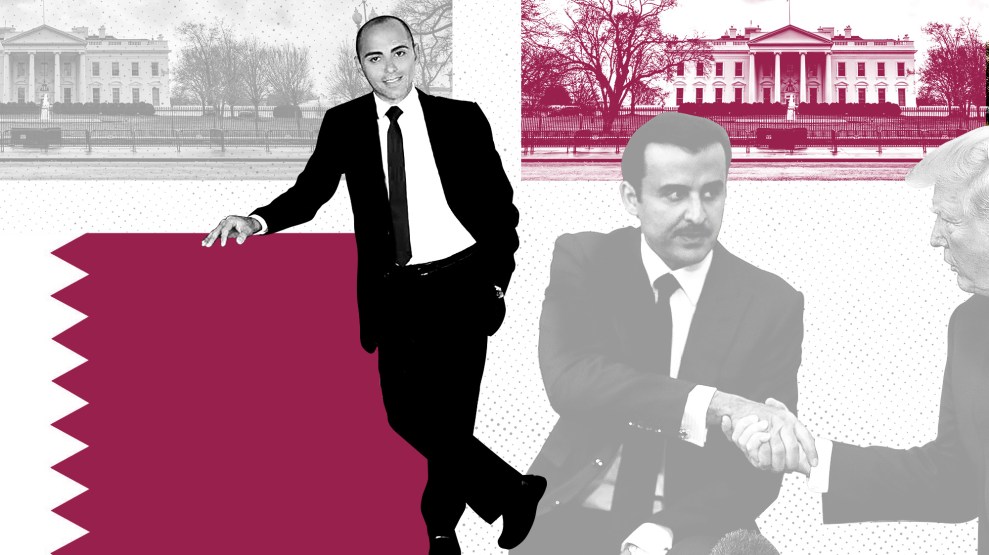
Mother Jones illustration; Joey Allaham/Flickr; Mark Wilson/dpa/AP; Getty Images
The Zionist Organization of America held its annual gala on November 12, 2017, at the Grand Hyatt Hotel in New York City—with an unusual guest on hand.
The group and its longtime president, Mort Klein, have been known for their zealous support of Israel’s right wing and their unrestrained attacks on what they consider to be Israel’s enemies. In recent years, that list has included Qatar, the small, natural-gas-rich Arab state. In 2014, the organization urged the US government to designate Qatar as a state sponsor of terrorism for “funding and promoting Nazi-like organizations that want to kill every Jew.” Yet sitting at a prominent table at the 2017 dinner was Ahmed al-Rumaihi, a former Qatari diplomat and, until March of that year, the head of Qatar Investments, a $100 billion division of the country’s sovereign wealth fund. Al-Rumaihi had come to the dinner at the invitation of Joseph Allaham, the former owner of a group of kosher meat restaurants, including the flagship Prime Grill in midtown Manhattan.
Al-Rumaihi and Allaham might have seemed an odd couple. But Allaham, a Syrian-born Sephardic Jew known to associates as “Joey,” had forged an unlikely alliance with al-Rumaihi aimed at helping Qatar win friends and influence powerful people in the United States. Their project included courting conservative Jewish Americans who viewed the Arab state located on the Persian Gulf coast as a threat to Israel.
Al-Rumaihi’s presence at the event was part of an extensive effort by Qatar to improve its relations with the Trump administration and its political supporters, as the small nation competes with Saudi Arabia and the United Arab Emirates, its regional rivals, for clout in the United States. In recent years, Qatar has been locked in a bitter dispute with its larger neighbors. For their part, Saudi Arabia and the UAE resent Qatar’s pursuit of friendly relations with Iran and its hosting of Al Jazeera, the media outlet that has often aired critical reports about Saudi and Emirati leaders. Tensions erupted into a major diplomatic showdown a year ago when Saudi Arabia, the UAE, Bahrain, and other states imposed a blockade against Qatar. Qatari officials believed the well-connected Saudis and Emiratis had lined up support in the Trump administration and in Congress for the blockade beforehand, and they subsequently scrambled to catch up by hiring several Washington, DC, lobbying firms.
This has led to a not-too-secret shadow war inside and outside Washington, with advocates of the Saudis and Emiratis on one side and partisans for Qatar on the other. It has been an unusual battle that has come to involve a lawsuit alleging that Qatari-tied hackers swiped emails from a top Republican fundraiser.
The efforts of Allaham, who was working for Qatar without registering with the US Justice Department as a foreign agent, was part of the larger Qatari influence campaign that seemed to win a shift in White House rhetoric in favor of Qatar. Yet in a dramatic reversal last week, Allaham broke with Qatar and declared he was ending his relationship with the state. The move came as his pro-Qatari activity was coming under scrutiny due to that lawsuit against Qatar, though he claims the lawsuit did not cause his reversal. Allaham also announced he would retroactively register as a foreign agent for Qatar, though he contended that he was not necessarily required by law to do so.
Al-Rumaihi, too, recently became involved in controversy. In April, the rapper Ice Cube and businessman Jeff Kwatinetz sued al-Rumaihi, whose company had invested in a professional basketball league that Ice Cube and Kwantinetz had launched. The lawsuit said that al-Rumaihi and other investors reneged on an agreement to put up $20.5 million in financing. In a filing, Kwatinetz alleged that al-Rumaihi had offered to make payments to former White House aide Steve Bannon—a friend of Kwatinetz—to “underwrite” Bannon’s political efforts. Kwatinetz also claimed that al-Rumaihi said he had made payments to “many Washington politicians,” including former national security adviser Michael Flynn. A spokeswoman for al-Rumaihi’s company contends Kwatinetz’s allegations are “pure Hollywood fiction.”
In May, Michael Avenatti, the lawyer for porn star Stormy Daniels, posted a photograph of al-Rumaihi with Michael Cohen, Donald Trump’s longtime fixer, in Trump Tower in late 2016.
Al-Rumaihi subsequently told the Intercept that Cohen had asked him for a $1 million payment so Cohen could hook up the Qatar Investment Authority with potential business partners in the United States. Cohen denied seeking such a payment.*
Months earlier, at the time of the ZOA dinner, al-Rumaihi was not yet a subject of headlines—and he was fixated on connecting with influential political players. Hours before the event, al-Rumaihi emailed Kwatinetz with a request. Under the greeting, “What’s up my brother!!” al-Rumaihi pressed Kwatinetz for an introduction to Bannon, who would be speaking at the dinner. “Need a quick favor if you have time,” he wrote. “I’m invited to the Zionist Organization of America’s 120 year anniversary this evening and Steve Bannon will be there. If you’re able to make a quick introduction and let him know that I’ll come up to him to say hello.”
Al-Rumaihi was invited to the dinner by Allaham, who purchased a table at the gala, according to several sources connected to the event. Joel Mowbray, a consultant who advises national security think tanks and is a harsh critic of Qatar, says in a signed declaration prepared for the Qatar lawsuit that when he asked Mort Klein about Al-Rumaihi’s presence at the dinner, Klein said to him, “What’s the problem? Joey [Allaham] paid me $100,000 for that table!” Allaham, who did not attend the dinner, declined to discuss whether he made a contribution to the ZOA.
Asked about Mowbray’s statement, Klein remarks, “I have no recollection of that, and I really doubt that I could have said anything about it.” Klein says his policy is to keep donor information private. He maintains that at the time of the dinner he was not aware of al-Rumaihi’s presence there. (After this story was published, Klein called Mowbray’s statement a “complete and total lie.”)
In his speech at the dinner, Bannon accused Qatar of financing Hamas and Egypt’s Muslim Brotherhood and praised the Saudis and the Emiratis for their blockade of Qatar. According to a spokeswoman for al-Rumaihi, after he heard the speech he decided not to introduce himself to Bannon.
During the ZOA dinner, Allaham’s rabbi, Elie Abadie, sat next to al-Rumaihi. Abadie recalls that he struck up a conversation with al-Rumaihi. “He said he wanted to improve the image of Qatar in the Jewish community,” Abadie says. “I told him he would have to work extremely hard to do so.”
Al-Rumaihi was apparently willing to do the hard work. The Qatari investor requested that Abadie introduce him to other guests at the dinner, where the crowd included US Ambassador to Israel David Friedman, former Sen. Joseph Lieberman, and celebrity attorney Alan Dershowitz. According to Abadie, al-Rumaihi suggested that Abadie visit Doha, the capital of Qatar. A spokeswoman for al-Rumaihi says he would not comment on Abadie’s recollection.
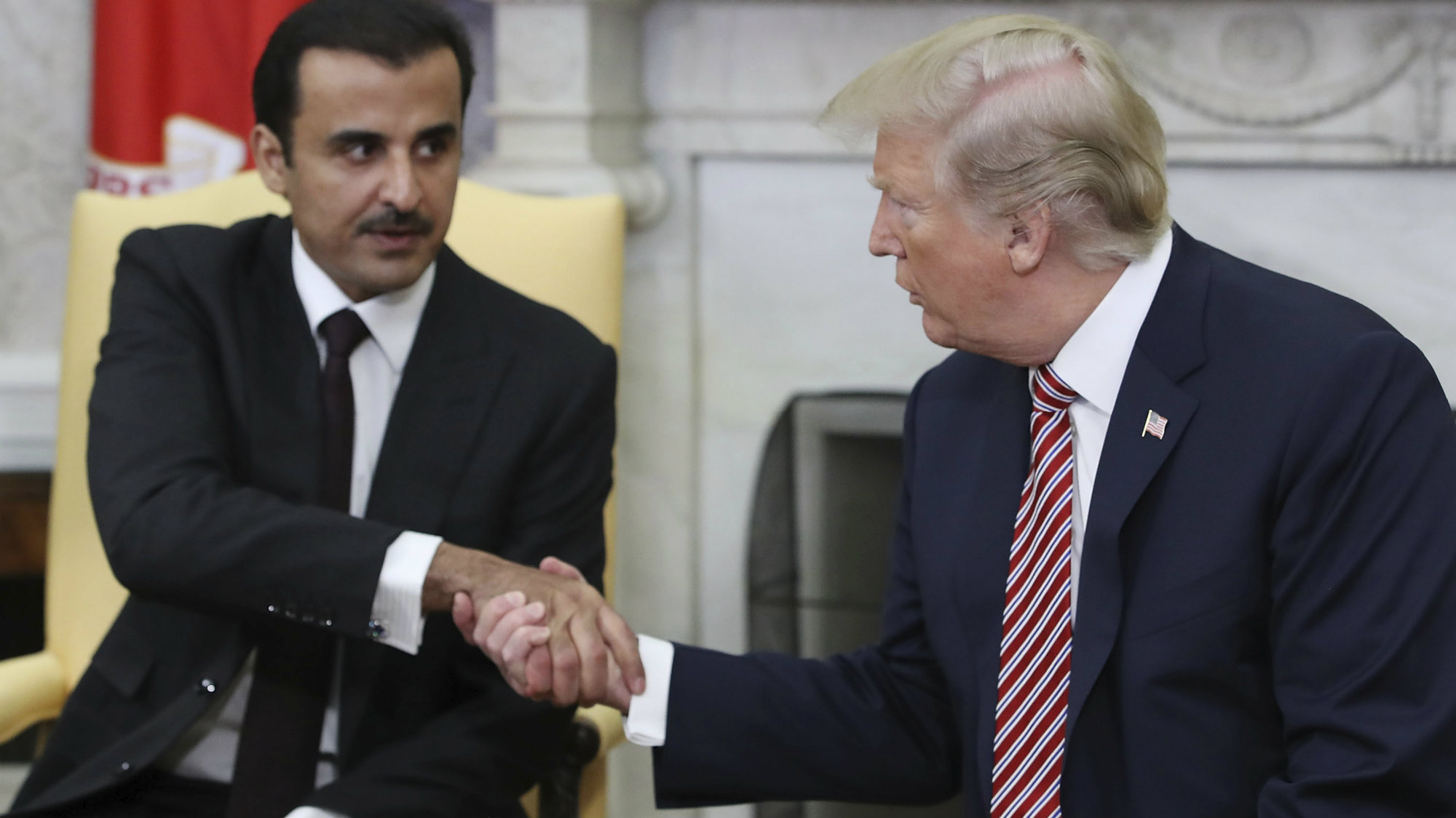
Less than a year after backing a blockade of Qatar, President Donald Trump met at the White House with Qatari Emir Tamim bin Hamad al-Thani and praised Qatar’s efforts to fight terrorism.
Mark Wilson / Pool via CNP/AP
Allaham, who is fluent in Arabic, first started gathering many of his political connections at his restaurants, which operated under the moniker Prime Hospitality Group. As part of his business, he also hosted luxury Passover getaways, for which he charged up to $11,000 a person in 2015. These trips included elaborate seders and an array of day programs, lectures, and on-site entertainment. For a Passover trip in 2015 at The St. Regis Monarch Beach, Allaham booked Sen. Ted Cruz (R-Texas)—who was courting major Jewish and pro-Israel donors in advance of his 2016 presidential run—as a main attraction. Cruz spoke alongside prominent rabbis and pro-Israel leaders.
But by the time Allaham arranged for Al-Rumaihi to attend the 2017 ZOA dinner, his small culinary empire was largely gone. Four of Allaham’s eateries, including Prime Grill, closed in the fall of 2017, amid a dispute with a landlord; a $1.5 million judgement imposed by an arbitrator in favor of Lincoln Square Synagogue over allegedly unpaid fees for banquet hall space; and a legal fight over the cancellation of a Passover trip earlier in 2017. (Lawyers involved in the suits over the banquet hall fees and Passover trip declined to comment.) Yet Allaham was already refashioning himself as a consultant and an adviser to foreign governments. And after years of schmoozing high-profile diners, Allaham had bankable connections.
In early 2017, Allaham began working with Nick Muzin, a Washington-based lobbyist, introducing Qatari officials to Muzin and to other influential Republicans. Allaham was paid by the Qataris for these efforts, according to three sources familiar with the arrangement. Allaham declined to discuss the details of any payments he received from Qatar.
In September 2017, Muzin registered with the Justice Department as a foreign agent for Qatar. Under the Foreign Agents Registration Act, known as FARA—which was passed in 1938 to combat Nazi propaganda—any Americans paid by a foreign entity to promote within the United States the interests of a foreign government, person, or organization must register with the Justice Department as a foreign agent. They also must describe their activities and disclose the payments they receive. In November, Qatar raised Muzin’s monthly payment from $50,000 to $300,000, half of which was set aside for subcontractors.
Muzin, a former senior aide for Ted Cruz who worked with the Trump campaign after Cruz quit the presidential race, was among a cadre of plugged-in Republican political operatives who opened lobbying shops after Trump’s election. Muzin’s company, Stonington Strategies, was incorporated in Delaware, but Muzin’s initial registration with the Justice Department listed the business address of the firm as 550 Madison Avenue in New York City. That was the site of the Sony Building, at the time the location of Allaham’s Prime Grill restaurant. In November, Muzin retroactively filed a form with the Justice Department disclosing a $52,000 payment he had made to Allaham in March 2017 for consulting work. But according to this filing, Allaham’s work for Muzin’s lobbying company had not been for Qatar but on behalf of a different client: the Democratic Party of Albania.
Shortly after being retained by Qatar, Muzin, an Orthodox Jew with legal and medical degrees, presented Qatari officials with a list of hundreds of politically prominent Americans who might be able to influence Trump, according to a source familiar with this project. The list included conservative Jews, such as Klein, who were vocal critics of Qatar. In June 2017, Klein’s ZOA had renewed its demand for the State Department to brand Qatar terrorists and had called on the Federal Aviation Authority to bar Qatar Airways from flying in the United States. Muzin’s plan was that Qatar could improve its standing in the United States by quieting some of its loudest critics. The Qataris “had to fix their relationship with the Jewish community in order to get to Trump,” a person involved with the Qatari lobbying effort explains.
Working with Muzin, Allaham took the lead in introducing Qataris to prominent American Jewish figures. He offered them trips to Doha, where they could meet with Qatari Emir Tamim bin Hamad al-Thani and other government officials, according to multiple people involved.
In the fall of 2017—prior to the ZOA dinner—Allaham approached Dershowitz, a prominent defender of Israel, at a Sabbath service at the Park East Synagogue in Manhattan to invite him to Qatar. “He told me the emir wanted to hear my views,” Dershowitz recalls. “He said he had a relationship with the Qatari government.” Dershowitz visited Doha in January. While there, he met with the emir, the emir’s mother, the Qatari ambassador to Gaza, the Qatari attorney general, the nation’s foreign minister, and other officials.
“There was no ask on their part,” Dershowitz says. “They just said they wanted to explain their situation. They are a small country between Saudi Arabia on one hand, a regional power, and Iran on the other. And they had to survive.”
Those who accepted trips organized by Allaham or Muzin included Klein; Malcolm Hoenlein, then the executive vice chairman of the influential Conference of Presidents of Major American Jewish Organizations; and Martin Oliner, the chairman of Religious Zionists of America. Another trip attendee was Menachem Genack, a rabbi who is CEO of the Orthodox Union Kosher Division, which oversees certification of thousands of kosher food facilities around the world.
Last month, Muzin filed a report with the Justice Department noting that the Qatari embassy had paid his firm $204,000 in December 2017 and January 2018 for “travel reimbursement.” The report lists 20 trips between US airports and Doha in November, December, and January, without noting the names of the persons who took the trips.
Upon his return from Doha, Dershowitz penned an op-ed praising Qatar and questioning claims about the state’s financial support of the Islamist fundamentalist group Hamas. “Qatar is quickly becoming the Israel of the Gulf States,” he wrote in The Hill. He noted that Qatar was like Israel in that it was “surrounded by enemies, subject to boycotts and unrealistic demands, and struggling for its survival.” Dershowitz’s op-ed drew media attention, and the attorney subsequently downplayed his comparison of Qatar to Israel. In a letter to the New York Times, Dershowitz maintained that he “never intended to compare Israel, a vibrant democracy, to any Gulf monarchy.”
Dershowitz returned to Qatar in early March 2018 to present a lecture on the law and the media at the Northwestern University Qatar campus. The speech was sponsored by the Qatar Foundation for Education, Science and Community Development, an organization controlled by the family of Qatar’s emir. Student activists protested the event, walking out of the lecture and chanting, “Zionists are not welcome here.” In an interview with Mother Jones, Dershowitz would not say if he was paid for the lecture. Dershowitz says his airfare was covered, but “I have no idea who paid.”
Dershowitz, who has won the president’s attention with aggressive televised defenses of Trump related to the Russia scandal, was invited to the White House on April 10 to discuss Middle East policy with White House staff. Dershowitz says he was in the White House for most of the day and joined Trump for dinner to discuss the Israel-Palestine conflict, Syria, and Iran. Those meetings occurred the same day that the Qatari emir met with Trump. A lobbyist for Qatar, who asked not to be identified, says Dershowitz’s presence in the White House the day the emir was there was seen as a boon for Qatar. Dershowitz, however, describes his overlap with al-Thani’s visit as a coincidence. “There was no discussion whatsoever of Qatar” with Trump or White House aides, he asserts. “I did not talk about Qatar.”
According to Mort Klein of the ZOA, the Qatari government paid to cover his brief trip to Doha in December 2017. In a March interview, Klein, who once denounced Qatar, praised the state for flying an Israeli flag at a recent handball tournament. “The emir told me last summer they stopped funding terrorist groups,” Klein said in that interview. He noted that on his Qatari-funded trip to Doha, he brought along 50 pages of demands, which included getting rid of anti-Semitic books sold at a Doha book fair and reducing alleged anti-Semitic programming on Al Jazeera. In this interview, Klein maintained that the Qataris were following up on the emir’s vow to look into the issues he raised: “So far, their promises have been kept. These things would not have happened if I had not gone to Qatar.”
But last week, Klein reversed course, and the ZOA issued a statement critical of Qatar, asserting Al Jazeera’s recent coverage of Israel and Gaza “has been despicably biased and incendiary” and slamming Qatar for holding a dinner honoring the Muslim Brotherhood leader Yusuf al-Qaradawi.
Malcolm Hoenlein visited Qatar in December on an Allaham-arranged trip. He says he was there for one day and met Emir al-Thani. He also met separately with other officials, including the head of Al Jazeera. Hoenlein says he and the emir had a “long talk” during which they covered regional politics and Al Jazeera and Hoenlein voiced his concerns about Qatari support for Hamas. “He accepted everything that I said,” Hoenlein recalls, noting he was withholding judgment to see if “they deliver on those things.”
Allaham has known Hoenlein since at least 2010, when he helped arrange a meeting between Hoenlein and Syrian President Bashar Assad. Last year, Allaham attended Hoenlein’s daughter’s wedding. As his guest, Allaham brought a younger brother of Qatar’s emir. Hoenlein says this member of the Qatari ruling family did not give his daughter a gift.
Qatari outreach has not been limited to Jewish leaders. In January—at the same time Dershowitz and Klein were in Doha—Mike Huckabee, the former Arkansas governor and father of White House press secretary Sarah Huckabee Sanders, also visited Qatar. “Just back from a few days in surprisingly beautiful, modern, and hospitable Doha,” Huckabee tweeted.
Muzin arranged Huckabee’s trip with the help of Dr. Joseph Frager, a practicing physician and pro-Israel activist who supported Huckabee’s 2016 presidential bid, according to a source familiar with this project. Frager tells Mother Jones that he was paid by Muzin’s firm to consult with Qatari officials and that he helped facilitate a meeting between Huckabee and the Qataris. Frager says he wanted to use that meeting to obtain Qatar’s help in retrieving the bodies of two fallen Israeli soldiers held in Gaza. Frager also met on his own with a brother of the emir, Mohammed bin Hamad bin Khalifa al-Thani, in 2017. He says that meeting was arranged by Muzin. After inquiries from Mother Jones, Frager registered with the Justice Department as a foreign agent and disclosed that Muzin had paid him $50,000 as a subcontractor for his Qatar work. Huckabee did not respond to a request for comment.
While working for Qatar, Allaham did not register with the Justice Department as a foreign agent for that country. But he did register as a foreign agent working for Muzin’s firm to assist the Democratic Party of Albania, the conservative opposition party in that Balkan nation. Earlier this year, Allaham declined to tell Mother Jones what he had done for the Albanian party. “It’s consulting,” he said. “That’s all I can say.” Muzin and Allaham each denied that the $52,000 payment Allaham received from Muzin’s lobbying shop was connected to Allaham’s Qatar-related work.
Joseph Sandler, a Washington, DC-based attorney who specializes in FARA issues, says Allaham’s unregistered activities for Qatar might “violate the terms of FARA and require registration with the Justice Department.” If Allaham performed work on behalf of the Qatari government, he was required to register with the Justice Department, Sandler notes.
Last month, Craig Engle, an attorney for Allaham, told Mother Jones that Allaham did not need to register as a lobbyist or foreign agent regarding Qatar. “Joey is not a registered agent of Qatar because the activity he is engaged in was exempt from the definition of registered activity under FARA,” Engle said. He would not elaborate.
But last Thursday, Allaham said he plans to register retroactively to cover his work. “When I started my work with Qatar, there was no fixed start date, no written contract, and their attorneys never told me whether I had to register with FARA,” he said in a statement provided by Engle. “I don’t know if I ever was a so-called legal agent of Qatar, but I do know that as of Friday I am not anything with them. So I am filing a combined FARA registration and termination report—it may not be legally required but I want the public record to be clear that I am no longer affiliated with them.”
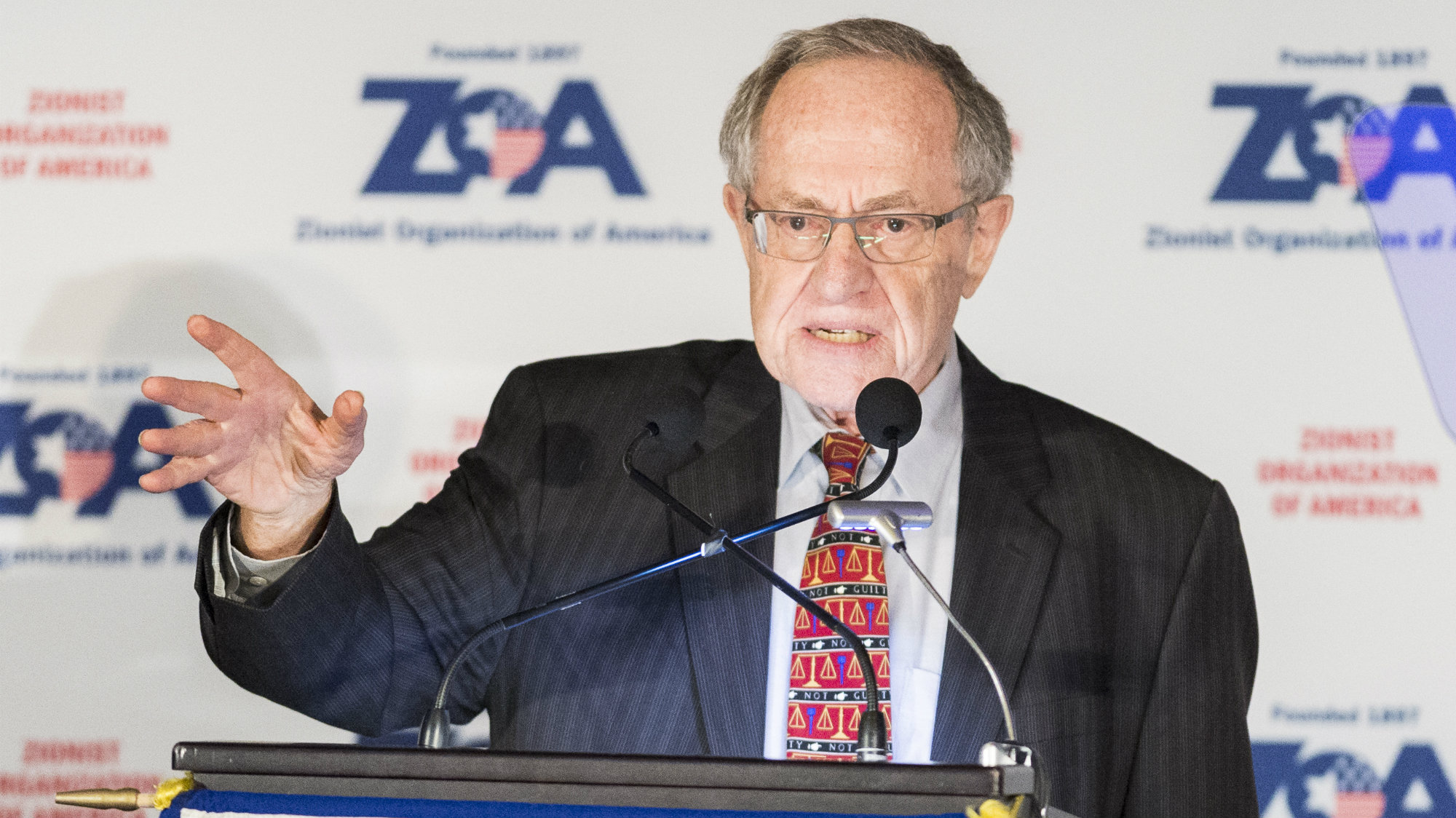
Alan Dershowitz speaks at the 2016 Zionist Organization of America dinner.
Michael Brochstein / ZUMA
As Allaham and Muzin connected Jewish leaders with Qatar, this effort sparked a bitter dispute within the conservative Jewish world. Elliott Broidy, a board member of the Republican Jewish Coalition and a top fundraiser for Trump and the Republican National Committee, was one of several prominent Jewish conservatives who criticized Muzin for signing up with Qatar.
According to the lawsuit Broidy filed this spring against Muzin, al-Rumaihi, Qatar, and others, Broidy had discouraged American Jewish leaders from joining the trips to Qatar. “I considered the effort to bring Jewish-American leaders to Qatar to be a despicable P.R. stunt by a government that sponsors organizations that murder innocent Americans and Israelis,” Broidy stated in that filing. He added that he previously talked many Jewish leaders out of accepting invitations to meet with the emir last September when al-Thani attended the UN General Assembly’s opening session.
In the lawsuit, Broidy claims that he has been targeted by Qatar and Muzin for his anti-Qatar efforts, alleging that hackers hired by Qatar unlawfully accessed his and his wife’s email accounts, stole emails and documents from them, and leaked the purloined material to the press. Broidy has recently been in the news due to his connection to a businessman whose alleged influence-peddling activities are reportedly being examined by special counsel Robert Mueller. Broidy also made headlines for using Michael Cohen to pay $1.6 million to a former Playmate with whom he had an extramarital affair.
On June 6, a judge overseeing the Broidy lawsuit ordered Allaham, whom Broidy’s legal team had named as a witness in this case, to comply with a subpoena from Broidy’s lawyers demanding he produce documents related to his relationship with Qatar and Qatari agents operating in the United States. Lee Wolosky, one of Broidy’s attorneys, said the order “affirms that American citizens who are hired by foreign governments are still subject to our laws here in the United States.”
It was after the judge’s order that Allaham ended his work for Qatar and said he would now register as a foreign agent. “Qatar enjoys portraying themselves as the purveyor of peace in the region,” he told Politico last week, “but this could not be further from the truth.” On the same day the order was issued, Muzin announced in a tweet that his firm was “no longer representing the State of Qatar.” He added, “I look forward to speaking out in the days ahead about the challenges we faced and what more needs to be done.”
The outreach to Jewish leaders organized by Allaham has been a small piece of Qatar’s campaign to generate goodwill among individuals who may have Trump’s ear. Advocates for the Qataris say this campaign has paid off. Last year, Trump called Qatar a “funder of terrorism” and backed the blockade by the country’s neighbors. And around that time, critics of Qatar within the United States were talking of removing an important US military base from Qatar. But in January, Trump called al-Thani and praised Qatar for being “one of the few countries” to sign a counterterrorism agreement with the United States. And in his April meeting with the emir, Trump told him he appreciated the country’s efforts to fight terror. “You’ve now become a very big advocate,” the president said. “And we appreciate that.”
Though he ended his networking for Qatar, Joey Allaham may not be finished working with foreign governments. According to several sources, he has developed a relationship with the government of Morocco. Dershowitz says that Allaham organized a March 2018 trip he took to Morocco, where Dershowitz met with several state officials. Allaham wouldn’t say whether he will register as a foreign agent for any work he does for that country.
* The descriptions of Ice Cube and Kwatinetz’s lawsuit against al-Rumaihi and al-Rumaihi’s interview with the Intercept have been revised for clarity and to correct the affiliation of the spokeswoman.


